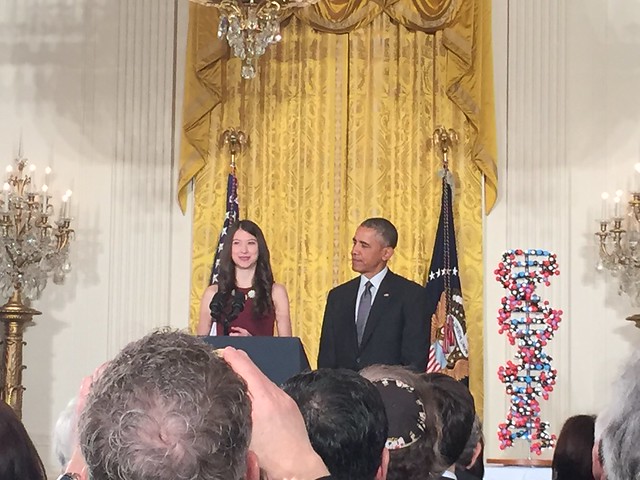Last Friday, 200 patients, advocates, scientists, doctors and researchers gathered at the White House to hear President Obama’s launch of the Precision Medicine Initiative. According to the President, precision medicine aims to tailor treatments to each individual. President Obama likened precision medicine to how we match blood transfusions to blood type – only now we should aim to match a wide range of treatments to a wide range of varying genetic and biounique markers.
The initiative begins with a budget request for $215 Million in new funds. The funds will be used, mainly at the NIH, to:
- Develop a national cohort of a million volunteers who will donate their health-related data for open research.
- Provide increased funding for research to identify genetic drivers of cancer.
- Help the FDA speed up the regulatory process
- Fund the development of data interoperability standards
But, what was remarkable about the day — in addition to the announcement which means a great deal to a great many — was the composition of the room and the event.
After most of the invited guests were seated (and selfies of the presidential podium were taken), approximately 20 more VIPs were escorted in to the front rows of the East Room.
They were patients, or families of patients.
The President was introduced by Elana Simon, a 19 year old student whose high school science fair project focused on a genetically identified treatment for her own liver cancer. In other words, the President of the United States was introduced by an e-Patient.
During his remarks the President introduced several of the patients, all of whom had benefited or stood to benefit from precision medicine.
“Most importantly we’ve invited patients, who have the most at stake” – @barackobama @WhiteHouse #PrecisionMedicine
— Nick Dawson (@nickdawson) January 30, 2015
And he didn’t stop there, announcing: “patients and advocates won’t be on the sideline, they’ll help us design [precision medicine research]”.
“Patients and advocates won’t be on the sideline. They’ll help us design this ” – @BarackObama @WhiteHouse #PrecisionMedicine
— Nick Dawson (@nickdawson) January 30, 2015
” #PrecisionMedicine is delivering the right treatments to the right person at the right time every time” – @BarackObama @WhiteHouse
— Nick Dawson (@nickdawson) January 30, 2015
Precision medicine, a term which could come to encompass a broad range of treatment and research options. Perhaps one of the most significant aspects of the initiative, for ePatients and open data proponents, is the proposal for an open cohort of donated health data. If the NIH is successful in sourcing over a million participants, the richness of the data could prove to reduce the discovery and cycle time for personalized treatments significantly.
Later in the day, during an informal discussion, head of the National Institute of Health, Dr. Francis Collins, remarked: “Really, I want to stop using the word patient. It’s participants. This is about being participatory in the process.”
So, to recap:
- President Obama was introduced by an e-Patient
- Patients and caregivers were the front row VIPs
- The President called patients the biggest stakeholders
- Dr. Collins called patients participants
Yep, that’s pretty much the biggest day in the history of the Movement!
You can watch Elana’s introduction and the President’s address here: White House – “Precision Medicine”
Postscript: later we learned that two other SPM members were invited to be present, so of the 2oo in attendance, three were SPM members! Erin Keeley Moore, who’s posted twice on this blog, and Donna Cryer, one of our newly elected board members, were there too. — e-Patient Dave







Thanks for this inspiring report, Nick! Indeed, ePatients have the most to gain from “precision medicine”–Mighty Caseys’ “snowflakes.”
I added a postscript – two more of us were there! Erin Keeley Moore and our new board member Donna Cryer were there. SPM in da house – and for a perfect event!
Thank you for writing this, Nick!